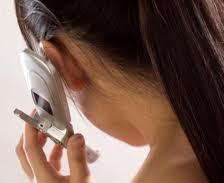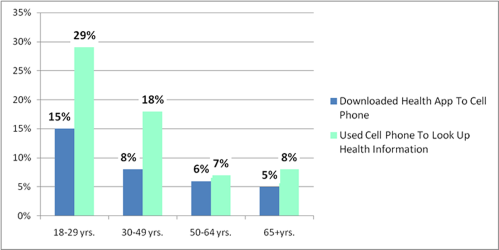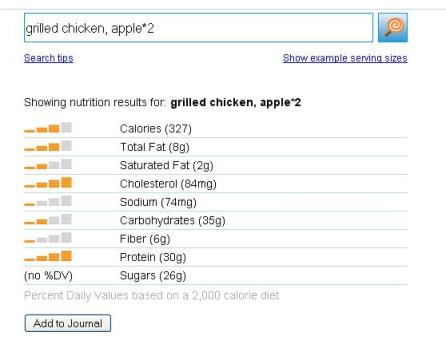February 26th, 2011 by PJSkerrett in Opinion, Research
No Comments »

 We all know that using a cell phone can stimulate the brain to work a bit harder. “Mr. Skerrett? This is Dr. LeWine’s office. Do you have a minute to talk about your test results?” or “Dad, a bunch of kids are going to Casey’s house after the dance. Can I go?” But a new study published in JAMA is making me wonder what the energy emitted by the phone itself — not just the information it delivers — is doing to my brain.
We all know that using a cell phone can stimulate the brain to work a bit harder. “Mr. Skerrett? This is Dr. LeWine’s office. Do you have a minute to talk about your test results?” or “Dad, a bunch of kids are going to Casey’s house after the dance. Can I go?” But a new study published in JAMA is making me wonder what the energy emitted by the phone itself — not just the information it delivers — is doing to my brain.
Here’s the study in a nutshell. Dr. Nora Volkow and her colleagues recruited 47 volunteers to have their brain activity measured twice by a PET scanner. Both times the volunteer had a cell phone strapped to each ear. During one measurement, both phones were turned off. During the other, one phone was turned on but muted so the volunteer didn’t know it was on; the other was left off. Each session lasted about an hour. The scans showed a small increase in the brain’s use of glucose (blood sugar) when the phone was on, but only in parts of the brain close to the antenna.
It was an elegant study. The researchers took pains to anticipate sources of error. They used a control (both phones off) against which to compare the effect of a “live” cell phone. They used cell phones on each ear, one on and one off, to see if the effect was localized. They muted the phone that was on to eliminate the possibility that any brain activation was due to listening to the sound of a voice coming through the phone’s speaker. So the result is probably a real one, not an artifact or measurement error.
What does this brain activation mean? No one really knows. As Dr. Volkow told NPR, “I cannot say if it is bad that they [cell phones] are increasing glucose metabolism, or if it could be good.” Read more »
*This blog post was originally published at Harvard Health Blog*
December 20th, 2010 by Bryan Vartabedian, M.D. in Better Health Network, Opinion
1 Comment »

The Internet has threatened journalism. Clay Shirky has said that everyone is a media outlet. An Internet connection and blogging platform makes everyone a publisher. Can the mass professionalization of journalism be applied to medicine or health? Can access to a broadband connection outfit a citizen to think and act like a physician?
There are pieces of what physicians do that can be replicated, and other pieces that can’t. The technical things that doctors do can’t be replaced. Removing an appendix or replacing a heart valve, for example. Tough to pull off on CureTogether.
But what about the thinking? After all, patients have access to the same information, references, and literature as physicians. Unfettered access to information can create an illusion. It can give us a false sense of control. Read more »
*This blog post was originally published at 33 Charts*
December 8th, 2010 by Iltifat Husain, M.D. in Better Health Network, News, Opinion
No Comments »

 Healthy People 2020, a continuation of Healthy People 2010, was started by the United States Department of Health and Human Services. It’s a nationwide health promotion and disease prevention plan that sets public health goals — with the deadline being 2020 in the latest iteration of the program.
Healthy People 2020, a continuation of Healthy People 2010, was started by the United States Department of Health and Human Services. It’s a nationwide health promotion and disease prevention plan that sets public health goals — with the deadline being 2020 in the latest iteration of the program.
The U.S. Department of Health and Human Services is now launching a challenge for developers and researchers to make wellness applications for the Healthy People 2020 campaign — they are providing rich research data sets for free, some that can be found here, giving developers and researchers ample data to write applications with.
They are also providing a list of topics for potential apps from a variety of categories, ranging from apps related to cancer to substance abuse. Read more »
*This blog post was originally published at iMedicalApps*
November 18th, 2010 by StevenWilkinsMPH in Better Health Network, News, Opinion, Research
No Comments »

What do cell phones and health-information seeking have in common? Very little, at least among the chronically ill (e.g., the folks who are driving healthcare use and cost). An American Medical News article about the latest Pew Research Center’s Internet & American Life Project study on mobile phone use caught my eye. The introduction to the article reads:
Despite the proliferation of cell phones in the United States, the number of people using them to access health information is low. But experts believe the sheer number of people using mobile phones and wireless devices means that health information eventually will get more mobile as well.
According to the study, 85 percent of Americans use mobile phones, but only 17 percent of cell phone owners have used them to look up health information. Nine percent of Americans have downloaded a health-related app on their cell phone.

Get this: The highest use of cell phone health-information seeking and downloading cell phone health apps was among 18- to 29-year olds at 29 percent and 15 percent respectively. With the exception of accidents, 18- to 29-year-old adults are generally among the most healthy demographic. Read more »
*This blog post was originally published at Mind The Gap*
November 18th, 2010 by Berci in Better Health Network, Health Tips, News, Research
No Comments »

Although I can check the calorie content of any food on WolframAlpha, it’s good to have a site that focuses only on this issue:
PhotoCalorie is an application inspired by the ideas of Dr. Mark Boguski of Harvard Medical School, who realized that the current methods available to track your daily nutrient intake are monotonous and simply too complicated. As a result, people would lose interest in tracking their diet or stop the diet all together. Our mission is to create the easiest food journal on the planet to help dieters lose weight and monitor their diet with ease.


*This blog post was originally published at ScienceRoll*
 We all know that using a cell phone can stimulate the brain to work a bit harder. “Mr. Skerrett? This is Dr. LeWine’s office. Do you have a minute to talk about your test results?” or “Dad, a bunch of kids are going to Casey’s house after the dance. Can I go?” But a new study published in JAMA is making me wonder what the energy emitted by the phone itself — not just the information it delivers — is doing to my brain.
We all know that using a cell phone can stimulate the brain to work a bit harder. “Mr. Skerrett? This is Dr. LeWine’s office. Do you have a minute to talk about your test results?” or “Dad, a bunch of kids are going to Casey’s house after the dance. Can I go?” But a new study published in JAMA is making me wonder what the energy emitted by the phone itself — not just the information it delivers — is doing to my brain.


















